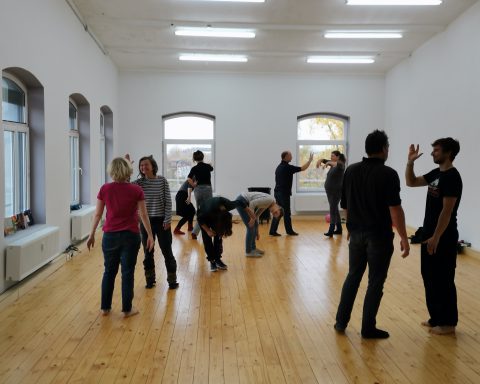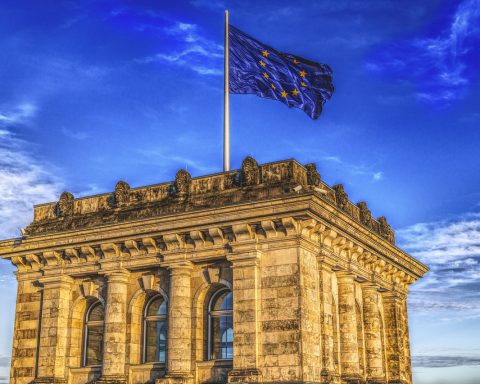This year on the 4th of July, the United States of America celebrated its 241st Independence Day. The US Consulate General in Leipzig picked July 11th to celebrate and to introduce the new Consul.

A long line of guests cheerfully went past invitation and security checks. Once past the gate, the VIPs introduced themselves to the Consul, while others relaxed over their drinks.
A sudden rainstorm pushed the guests to huddle under a few huge white garden umbrellas. But as the ceremonial ritual was to begin, the sun came out again.
As usual, a small uniformed unit walked in unison to bring in and hold three US flags. As usual, a singer sang the anthem, “The Star-Spangled Banner”. As usual, the guests were not quite sure whether it was proper to applaud or greet with profound silence this masterly achievement.
Still, this time, there were a few deviations from the ritual.
To start with, the uniformed unit featured two women and several skin colors. But these were not the US Marines normally performing during such ceremonies, but several – very sympatico as it turned out later, when we stood in line for the traditional hamburgers – officers from the 7th Army Noncommissioned Officer Academy, Joint Multinational Training Command, Grafenwöhr.
Secondly, the Charge d’Affaires ad interim, Kent D. Logsdon, from the US Embassy in Germany, opened the ceremony and made a speech. I think everybody present took note of his reference to the shared values keeping friendships together despite differences. Yes, this time differences loom large, and I was looking forward to the German speeches to see what they would make of them.

At the end of his speech, he introduced Timothy Eydelnant, the new Designated Consul General to Leipzig and Middle Germany (Designierter Generalkonsul zu Leipzig und Mitteldeutschland). Logsdon placed emphasis on the new Consul’s long series of assignments in humanitarian and diplomatic service.
Then Logsdon added that although the Consul did not like to bring it up much, he himself came to the US – a country which he now represents – as a refugee. Then he introduced and called onto the stage the Consul’s male partner. Three press photographers ran forward to take note of this sensation.
While biking past it the following day, I noticed that the US Consulate now features a rainbow flag on its side.

At the overpriced but irresistible bio cafe Macis, I checked out the local daily newspaper, LVZ, with which I have had numerous arguments about its representation of migrants in the past. I had to turn many pages to find a report of the news on page 16. The report featured a photo of the new US Charge d’Affairs next to the city mayor, and the Consul and his partner bracketing the mayor’s wife. A politically super-correct article which, however, appeared not on any first page but in the section entitled “Leipzig”.
The story came after big articles on a few murder cases, a cancelled street festival on Karli, etc. It mentioned the Consul’s same-sex partner, but, besides being relegated towards the back, shied away from a more provocative word: homosexuality.
Normally the speeches of newly appointed or departing US Consuls are followed by the speeches of a couple German officials – regional and local. Normally in these speeches the gratitude to the Americans / the US Army for liberating Saxony from the Nazis is expressed, and a recent US achievement and its benefits for the world are praised. Last year it was the passing of same-sex marriage law.
But this time there was no such speech and no German speakers. With a mixture of disappointment (I was very curious what a German official would sweat out to be grateful for this year!) and relief (no more waiting for a permission to hit the buffet) I heard the new Consul invite the gathered guests to the table.
Still I wondered out loud whether they could not find a speaker willing to praise the US this year, especially since the city mayor was present. My companion pointed out to me that I perhaps had spoken too loud, since the city mayor stood right behind me and could overhear me. I now regret not having asked him whether he had been asked to hold a speech but found a diplomatic way of declining.
So Leipzig, second only to Berlin as a place of gay liberation during GDR times (see Jochen Kleres’s “Cherries Blossoming in Eastern Germany?” in 2001’s Pink, Purple, Green), is now blessed with a homosexual and a former refugee now representing the US as Consul here.
My first thought was that this appointment is meant to pacify whatever qualms Leipzig and “Middle German” academic, artistic and business circles might have about President Trump and his much criticized presidential rule. It must be to build and maintain bridges despite the new President. A shrewd diplomatic move, I thought.
Then I remembered that this is a third “minority” appointment in Leipzig.

It seems like just a few years ago, the US Consul to Leipzig and Middle Germany was, I believe, African-American. His predecessor was a woman. The question is why. Several interpretations are possible, some of which do not necessarily contradict each other.
Diplomatic appointments reflect US equal rights / affirmative action policy, so they now include minority persons. Prior to this great change, diplomacy had been a conservative domain – in every Western country by the way. In the US it was reserved for white Protestant males who had to reflect mainstream values: conservative, religious, married, with children, vice-less and unperturbed, preferably even callous.
A novel on a British Consul who failed on nearly all these counts, Under the Volcano by Malcolm Lowry, became a much acclaimed classic in the century just passed by. The Constant Gardener (2005) – one of this century’s great movie successes – is a twist on the same theme. Needless to say, I highly recommend both. They reinforce the point that a professional diplomat is to be unperturbed or gets into trouble, both personal and political.
Getting back to the newest Consul to Leipzig: appointing minority persons to the Leipzig post can be interpreted as a compliment to Leipzig and its reputation as a “city open to the world” (weltoffene Stadt). This despite Legida and, earlier, massively resisted, yet two decades long Neo-Nazi – successful and failed – marches to Völkerschlachtdenkmal.
It could also be interpreted, however, as a paternalistic policy device, meant to show the presumably uncivilized population and its government what an enlightened great power such as the US stands for. The appointment could be understood as a missionary, civilizing gesture.
Was it just this past year that the US gift to the world in the form of the Supreme Court legalizing same-sex marriage nationwide in 2015 was dutifully acknowledged and praised during a similar Independence Day celebration here in Leipzig? It is only fitting that the VIPs in Leipzig and Middle Germany should taste this very law’s fruits.
Finally, the new appointment could also stand for the relative insignificance of Leipzig and Middle Germany in a larger scheme of things. Precisely because they are insignificant, they can be entrusted to minority diplomats, presumably not headed for great careers in the diplomatic corps anyhow. Cruel but true?
Personally, I hope that the new US Consul and his partner will enjoy their three years in Leipzig and Middle Germany a lot.
Still I cannot help but ask myself how a refugee from Minsk, who escaped as a sixteen year old a totalitarian regime falling apart and a future under a dictator, feels about President Trump and his own appointment to Leipzig.
This appointment is not just about looking forward to exciting new challenges and tasks here, as he said. It is potentially also about handling delicate diplomatic situations when the President acts up. Does the new Consul hope that these will not emerge?

Even more importantly, does the new Consul ban from his mind any comparisons to other authoritarian, populistic rulers who suggest themselves? Or is he playing with the idea of seeking asylum in Leipzig just like many other of his compatriots fleeing the increasingly authoritarian US to France, Germany and other countries do? What an irony. How does the proverb go? From under the rain into a maelstorm?









